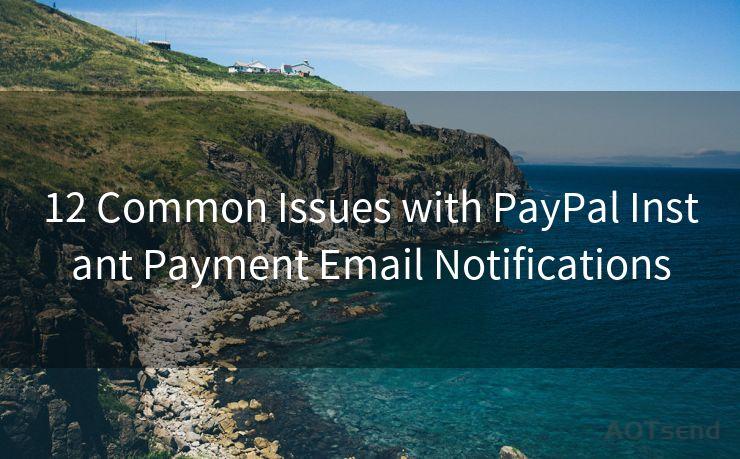12 Common Issues with PayPal Instant Payment Email Notifications




PayPal, as one of the most popular online payment platforms, offers convenient instant payment email notifications to keep users informed about their transactions. However, these notifications can sometimes encounter issues. In this article, we'll explore the 12 most common problems users face with PayPal's instant payment email notifications and suggest possible solutions.
1. Delayed or Missing Notifications
One of the most frequent complaints is the delay or absence of email notifications. This can be due to server lags, email provider issues, or even incorrect email settings in your PayPal account. Ensure your email address is correctly entered and check your spam folder in case the notifications are being misdirected.
2. Incorrect or Outdated Information
Sometimes, notifications may contain incorrect or outdated transaction details. This could be caused by a sync issue between PayPal's servers and your account information. To resolve this, make sure your PayPal account details, including shipping and billing addresses, are up to date.
3. Duplicate Notifications
Receiving duplicate notifications for the same transaction can be confusing and annoying. This issue often arises from a system glitch or a Resend request initiated by PayPal. If this happens frequently, contact PayPal support for assistance.
4. Notification Language Issues
Users may receive notifications in a language they don't understand, especially if they've traveled or used a VPN that changed their apparent location. You can fix this by going to your PayPal settings and ensuring the preferred language is correctly set.
5. Unreadable or Malformed Emails
Occasionally, email notifications may arrive in a garbled or unreadable format. This is often caused by email client compatibility issues. Try viewing the email in a different email client or using PayPal's web interface to check transaction details.
6. Phishing Scams and Fake Notifications
Be cautious of phishing emails that mimic PayPal notifications. These emails may contain malicious links or attachments. Always verify the sender's email address and never click on suspicious links. Report any such emails to PayPal immediately.
7. Unsubscribe Issues
Some users may find it difficult to unsubscribe from PayPal's email notifications. The unsubscribe link is usually at the bottom of the email. If it doesn't work, adjust your notification settings directly through your PayPal account.
8. Mobile Notification Issues
For those who rely on mobile notifications, problems may arise if the PayPal app is not updated or if there are issues with the device's notification settings. Ensure the app is up to date and check your device's settings to allow PayPal notifications.

🔔🔔🔔
【AOTsend Email API】:AOTsend is a Managed Email Service for sending transactional emails. Support Email Types: reminders, authentication, confirmations, notifications, verification codes, invoices, password resets, account activations, billing statements, two-factor authentication (2FA), and one-time passwords (OTP) emails, etc. $0.28 per 1000 Emails. 99% Delivery, 98% Inbox Rate.
You might be interested in:
Why did we start the AOTsend project, Brand Story?
What is a Managed Email API, How it Works?
Best 25+ Email Marketing Platforms (Authority,Keywords&Traffic Comparison)
Best 24+ Email Marketing Service (Price, Pros&Cons Comparison)
Email APIs vs SMTP: How they Works, Any Difference?
9. Transaction Details Not Showing
Occasionally, the transaction details in the email notification may not load or display correctly. This could be due to a temporary server issue or a problem with the email formatting. Logging into your PayPal account directly will often provide the missing information.
10. Emails Marked as Spam
If your email provider mistakenly marks PayPal notifications as spam, you may need to adjust your spam filter settings or add PayPal's email address to your safe sender list.
11. Inability to Access Links in Emails
Links within the email notifications may sometimes be unresponsive or lead to error pages. This can be caused by expired links or server issues. If this happens, try accessing the information directly through your PayPal account.
12. General Account Security Concerns
While not directly related to email notifications, it's important to maintain strong account security. Regularly update your password, use two-factor authentication, and monitor your account for any suspicious activity.
In conclusion, while PayPal's instant payment email notifications are a convenient feature, they can sometimes encounter issues. By following the troubleshooting tips outlined above, you can resolve most problems and ensure you're always kept up to date with your PayPal transactions. Remember, security is paramount, so always be vigilant when handling any financial information online.




Scan the QR code to access on your mobile device.
Copyright notice: This article is published by AotSend. Reproduction requires attribution.
Article Link:https://www.mailwot.com/p3969.html



